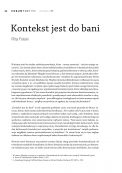Is William R. Kenan, Jr., Professor of English at the University of Virginia, and editor of New Literary History. Felski is a prominent scholar in the fields of aesthetics and literary theory, feminist theory, modernity and postmodernity, and cultural studies. She is the author of Beyond Feminist Aesthetics: Feminist Literature and Social Change (Harvard UP, 1989), The Gender of Modernity (Harvard UP, 1995), Doing Time: Feminist Theory and Postmodern Culture (New York UP, 2000), Literature After Feminism (Chicago UP, 2003), and Uses of Literature (Blackwell, 2008). Her most recent book, The Limits of Critique (Chicago UP, 2015), is on the hermeneutics of suspicion as mood and method and has been widely reviewed. Felski is the editor of Rethinking Tragedy (Johns Hopkins, 2008) and co-editor of Comparison: Theories, Approaches, Uses (Johns Hopkins, 2013) and Critique and Postcritique (Duke UP 2017). She has also published articles in numerous essay collections and in such scholarly journals as PMLA, Signs, New Literary History, Modernism/Modernity, Cultural Critique, Theory, Culture and Society, and New Formations.
Zajmuje stanowisko William R. Kenan Jr. Professor of English na University of Virginia. Jest redaktorką New Literary History. W swych badaniach intensywnie zajmuje się teorią literatury i estetyką, modernizmem i postmodernizmem, teorią feministyczną i studiami kulturowymi. Jej najnowsze książki to Uses of Literature (2008; wyd. polskie Literatura w użyciu, 2016), The Limits of Critique (2015) oraz Critique and Postcritique (2017). Aktualnie pracuje nad książką o załącznikach (attachments) do dzieł sztuki. Zajmuje również stanowisko Niels Bohr Professor na University of Southern Denmark, gdzie kieruje projektem badawczym o „Literaturze w użyciu”.

We publish Polish translation of Rita Felski’s “Context Stinks!”, New Literary History, Volume 42, Number 4, Autumn 2011, pp. 573-591. Published by Johns Hopkins University Press.
See the article.

Niniejszy tytuł to niezbyt subtelna prowokacja, która – muszę zaznaczyć – nie jest mojego autorstwa. Czy istnieje jakieś słowo, które byłoby bardziej wszechobecne w badaniach literackich i kulturowych, słowo, które solenniej przywołujemy, gorliwiej bierzemy w obronę, takie, któremu nabożniej się kłaniamy? (...)
